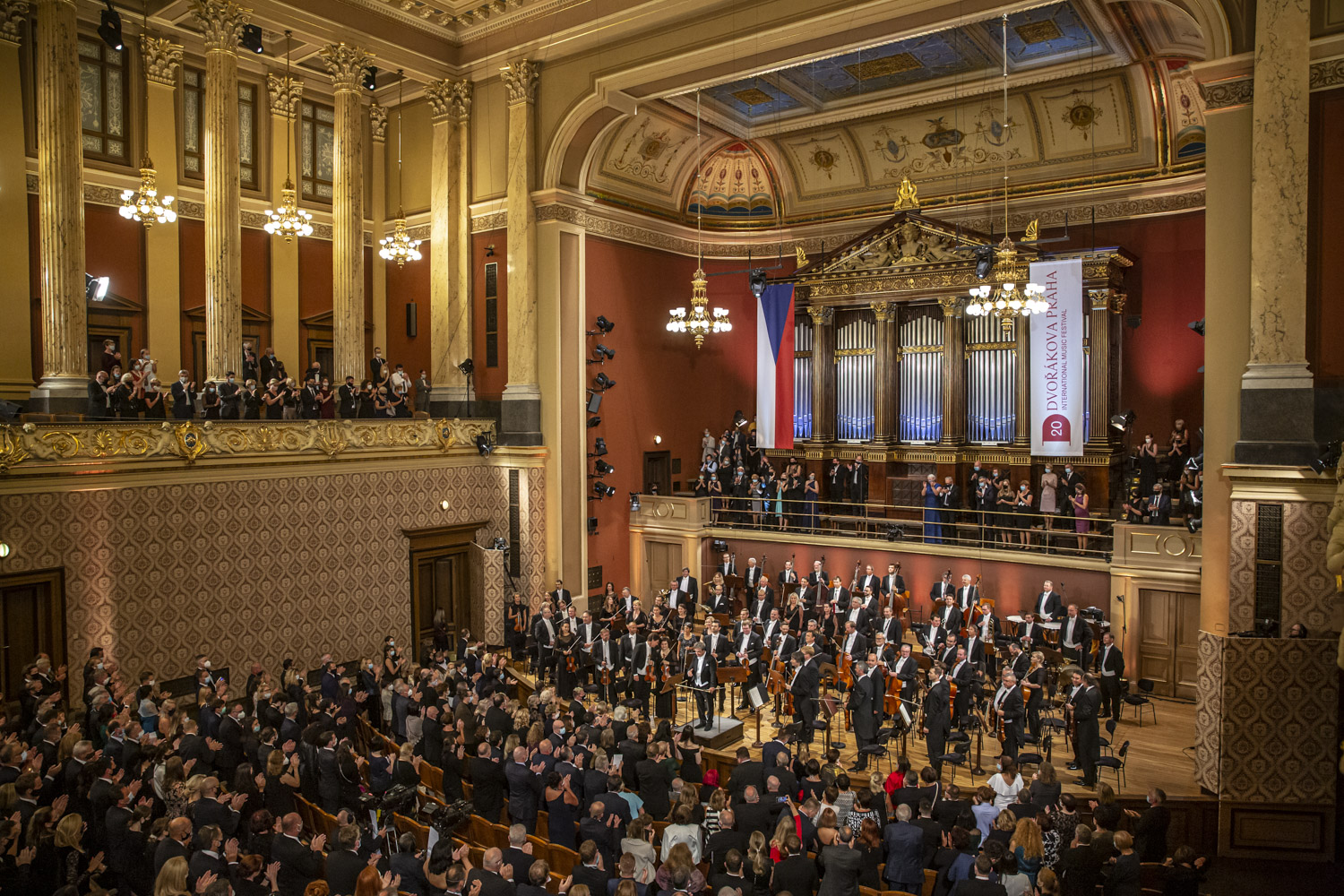
Antonín Dvořák: Rusalka, op. 114, B. 203
The moon bathes the entire world in clear light and the hunter vainly hunts for his white doe. The fairytale atmosphere of Rusalka is so intoxicating that it enables us to forget the depth of understanding for stature and wretchedness that are common to both people and supernatural creatures. Dvořák and Kvapil’s Rusalka is a lyric story of desire for a human soul which is full of sin, but also love. It is about the fleetingness of great sentiments and the inability to communicate. But also about the fact that it is not possible to take back one’s decisions. Rusalka is not only a fairytale about unrequited love, but also a psychological and symbolic drama, which has rightfully become one of the most frequently performed Czech operas of the present day.
The conductor Jiří Bělohlávek said of Rusalka that it touches on all aspects of human nature, namely love, desire, passion, betrayal, revenge, death, abandonment and sacrifice, in such a fascinating and natural arc that it takes one’s breath away.
The Dvořák Prague festival has joined forces with the Czech Philharmonic and its principal conductor Semyon Bychkov in order to jointly follow on from the previous activities of the festival’s Opera in Concert series with a performance of Dvořák’s operatic gem. After performances of Dvořák’s lesser known operas, this performance will be of the one that made Dvořák internationally famous as an operatic composer. Semyon Bychkov and the festival’s dramaturgy have invited a group of international soloists such as can be heard at the most famous opera and concert houses around the world. All aspects of Dvořák’s best opera will thus light up with the uninterrupted power of the author’s music.
Gramophone’s 2024 ‘Orchestra of the Year’, the Czech Philharmonic gave its first concert – an all-Dvořák programme conducted by the composer himself – in the famed Rudolfinum Hall on 4 January 1896. The Orchestra is acknowledged for its definitive interpretations of Czech composers and recognised for its special relationship with the music of Brahms, Tchaikovsky, and Mahler, who conducted the world première of his Symphony No. 7 with the Orchestra in 1908. It is currently recording the complete cycle of Mahler symphonies with Chief Conductor and Music Director Semyon Bychkov for Pentatone.
The Czech Philharmonic’s extraordinary and proud history reflects both its location at the very heart of Europe and the Czech Republic’s turbulent political history, for which Smetana’s Má vlast has become a potent symbol. 2024 was the Year of Czech Music, a major celebration launched on the bicentenary of Smetana’s birth and held across the Czech Republic every ten years. The Czech Philharmonic marked Smetana’s bicentenary with a series of concerts at the Smetana Litomyšl Festival, including a rare concert performance of his opera Libuše, conducted by Principal Guest Conductor Jakub Hrůša.
The contribution of the Czech Philharmonic and Semyon Bychkov to the Year of Czech Music was the Dvořák Festival, a combined performance of three overtures, instrumental concerts, and the last three symphonies of Antonín Dvořák, both in Prague and on tour in South Korea, Japan, Spain, Austria, Germany, Belgium, and France. The highlight of the Year of Czech Music performed by Semyon Bychkov and the Czech Philharmonic was a series of three concerts in New York's Carnegie Hall.
Alongside the Czech Philharmonic’s Youth Orchestra, Orchestral Academy, and Jiří Bělohlávek Prize for young musicians, a comprehensive education strategy engages with more than 400 schools, bringing students of all ages to the Rudolfinum – some travelling as long as four hours – to hear concerts and participate in workshops. An inspirational music and song programme led by singer Ida Kelarová for the extensive Romani communities within the Czech Republic and Slovakia has helped many socially excluded families to find a voice.
An early champion of the music of Martinů and Janáček, the works of Czech composers – both established and new – remain the lifeblood of the Orchestra. Instigated by Semyon Bychkov at the start of his tenure, nine Czech composers and five international composers – Detlev Glanert, Julian Anderson, Thomas Larcher, Bryce Dessner, and Thierry Escaich – were commissioned to write for the Orchestra.
source: Česká filharmonie
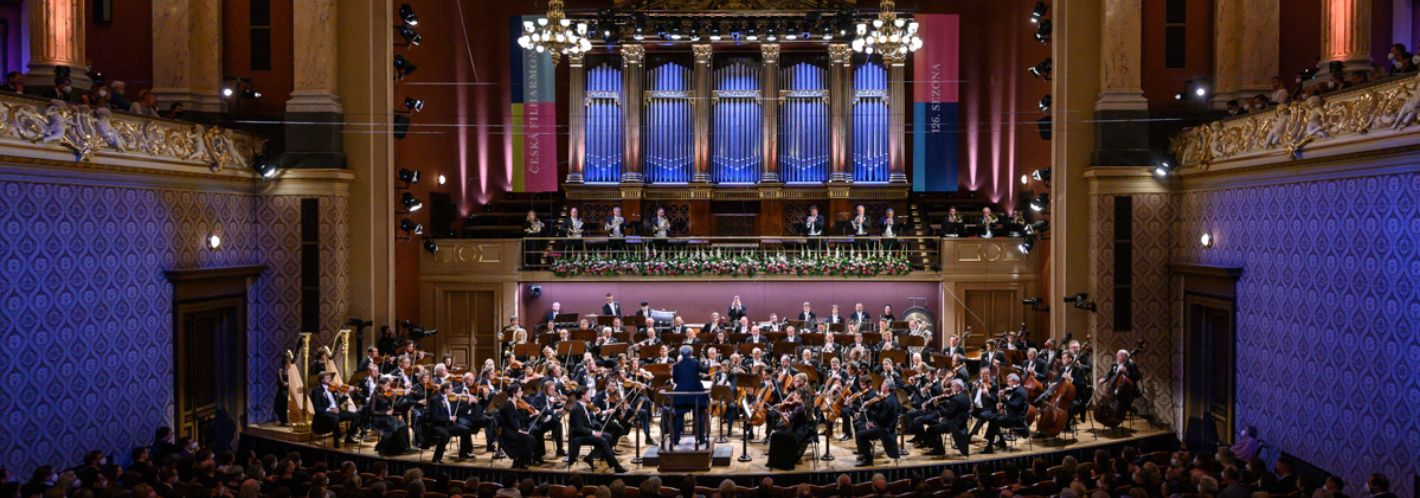
Semyon Bychkov is one of today’s most sought-after conductors because of his clear opinions on interpretation and his emphasis on beauty of sound. He was born in 1952 in what was then called Leningrad, and he graduated from the conservatoire there. After emigrating from the Soviet Union to the United States in the 1970s, he soon earned an outstanding international reputation. He has been a long-term collaborator with the world’s best orchestras, including the philharmonic orchestras in Vienna, Berlin, and Munich, the Leipzig Gewandhaus Orchestra, the London Symphony Orchestra, and the New York Philharmonic. He also devotes himself intensively to opera, conducting at the Metropolitan Opera in New York, the Vienna State Opera, the Teatro Real Madrid, La Scala in Milan, and the Opéra national de Paris, where he has conducted productions of operas ranging from Mozart’s Don Giovanni to Strauss’s Elektra. He also has a vast discography, including highly acclaimed recordings of Verdi’s Requiem and Wagner’s Lohengrin and the complete symphonies of Brahms. Since the 2018/19 season, he has been the chief conductor of the Czech Philharmonic.
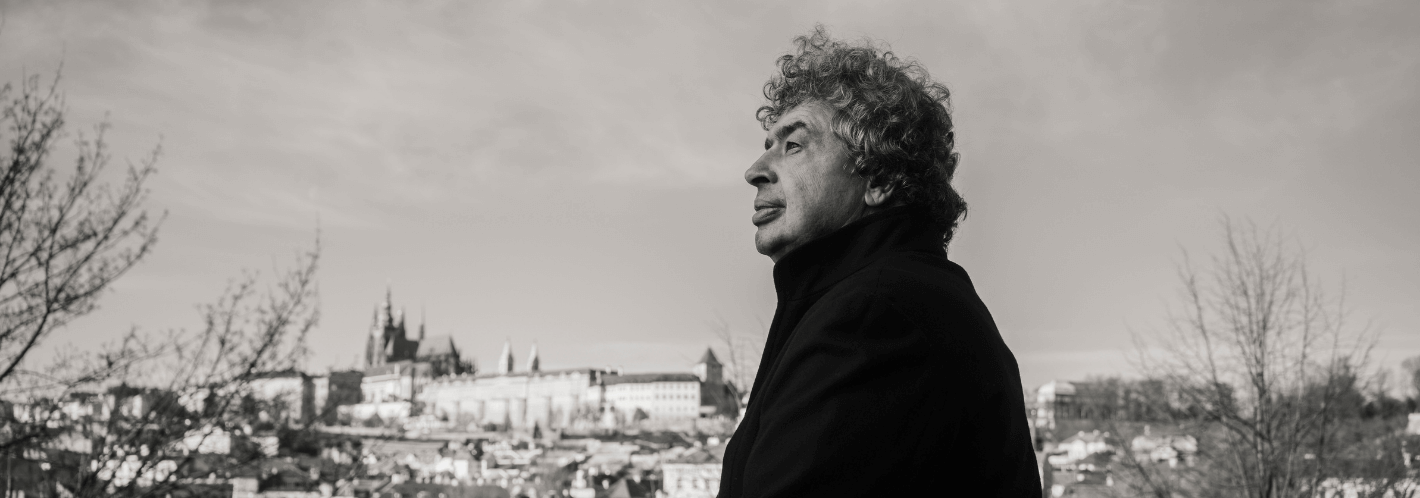
The Prague Philharmonic Choir (PPC) was founded in 1935 by choirmaster and teacher Jan Kühn. Now in its 91st season, it is the oldest professional choir in the Czech Republic. The choir is celebrated beyond Czech borders, especially for its interpretations of oratorios and cantatas. Lukáš Vasilek has served as Principal Conductor and Artistic Director since 2007, joined by Lukáš Kozubík as the choir’s Second Choirmaster.
Under Lukáš Vasilek’s leadership, the Prague Philharmonic Choir has established a reputation as a highly esteemed performing partner of leading international orchestras. At home, the ensemble collaborates regularly with the Czech Philharmonic and, for its own choral concerts, with the Prague Philharmonia. Internationally, the PPC has worked with ensembles such as the Berlin and Dresden Philharmonic Orchestras, Wiener Symphoniker, NDR Elbphilharmonie Orchestra, and the Hong Kong Philharmonic Orchestra.
The PPC has also gained extensive experience working with the world’s top conductors, including Semyon Bychkov, Jakub Hrůša, and Sir Simon Rattle. The choir regularly appears at the Czech Republic’s most renowned festivals, such as Smetana’s Litomyšl, Prague Spring, Dvořák Prague, and Days of Bohuslav Martinů. Since 2010, the PPC has served as Choir in Residence at the Bregenzer Festspiele.
In its 91st season, the Prague Philharmonic Choir will embark on further exciting collaborations with world-renowned conductors, including Zubin Mehta, Antonio Pappano, and Giovanni Antonini.
Alongside its performances, the PPC engages in numerous educational projects. Every season, it presents a cycle of educational concerts for children, catering to both school groups and families. These programs emphasize fun and active engagement with young listeners. The PPC Choral Academy in Honour of Soňa Červená offers singing students the opportunity to gain hands-on experience in a professional ensemble, participate in large-scale musical projects, and learn from collaborations with leading artists.
The choir’s artistic excellence is further demonstrated through its rich recording archive, which continues to expand each season. The PPC has appeared on releases from PENTATONE, Decca Classics, Sony Classical, and Supraphon. Its recordings have earned numerous international accolades, including awards from Gramophone, BBC Music Magazine, and the prestigious Diapason d’Or de l’Année. The PPC’s very first recording, made in 1952, featured Dvořák’s oratorio Stabat Mater conducted by Václav Talich. Its most recent release, Stravinsky, Janáček, Bartók: Village Stories, explores the magic of folk songs and traditional rituals in the music of three 20th-century masters.
The Prague Philharmonic Choir is a laureate of the 2018 Classic Prague Award for Best Vocal Concert, Czech Television’s Classical Music of the Year Award, and the 2022 Antonín Dvořák Prize for exceptional artistic achievements and the promotion of Czech music. The album Village Stories received the Choc de Classica award in May 2024.
source: Prague Philharmonic Choir
photo © Petr Chodura
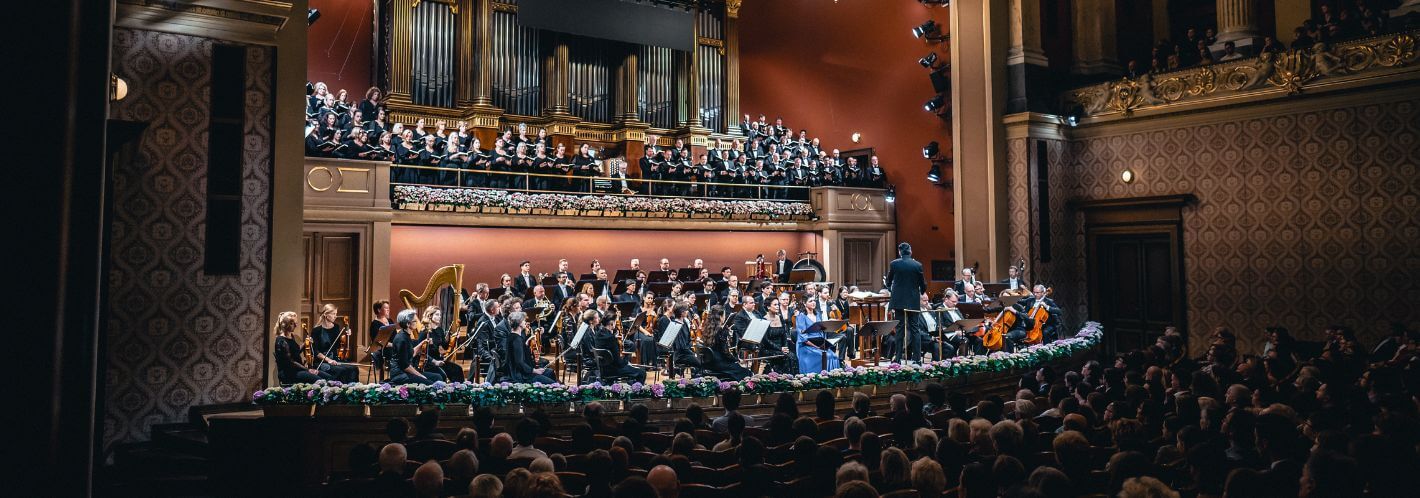
This season marks Lukáš Vasilek’s 18th year as the Principal Conductor and Artistic Director of the Prague Philharmonic Choir (PPC). Whether conducting a cappella repertoire or large-scale cantatas and oratorios with orchestra, Vasilek brings his deep understanding of choral music to every performance. Under his leadership, the PPC regularly collaborates with leading Czech and international orchestras and conductors.
Vasilek has received particular recognition for his outstanding interpretations of the great choral works of Mahler, Dvořák, and Janáček. Notable highlights include Benjamin Britten’s War Requiem, Francis Poulenc’s Stabat Mater, and Arthur Honegger’s Jeanne d’Arc au bûcher. He is also known for his adventurous programming, incorporating jazz and spirituals into the PPC’s repertoire.
Lukáš Vasilek studied conducting at the Academy of Performing Arts in Prague and musicology at Charles University. He occasionally returns to his orchestral conducting roots, working closely with the Prague Philharmonia on their choral concert cycle in collaboration with the PPC, a partnership now in its fourth year. He has also conducted musicians of the Czech Philharmonic and the Kyiv Symphony Orchestra.
Vasilek’s first experience with choral singing came as a member of the Boni Pueri boys’ choir. He later served as choirmaster of the Foerster Chamber Choir and the Prague National Theatre Choir. In 2022, he was a guest conductor for the French ensemble Accentus. In addition to his work with the PPC, he is the founder and conductor of the vocal ensemble Martinů Voices, established in 2010, focusing on chamber choral music from the 19th to 21st centuries. Until recently, he also taught choral conducting at the Academy of Performing Arts.
Lukáš Vasilek’s choral and orchestral work is featured on numerous recordings for Decca Classics and Supraphon. His recent recordings of Bohuslav Martinů’s choral works have earned international acclaim, winning awards from Gramophone, BBC Music Magazine, and Diapason.
source: Pražský filharmonický sbor
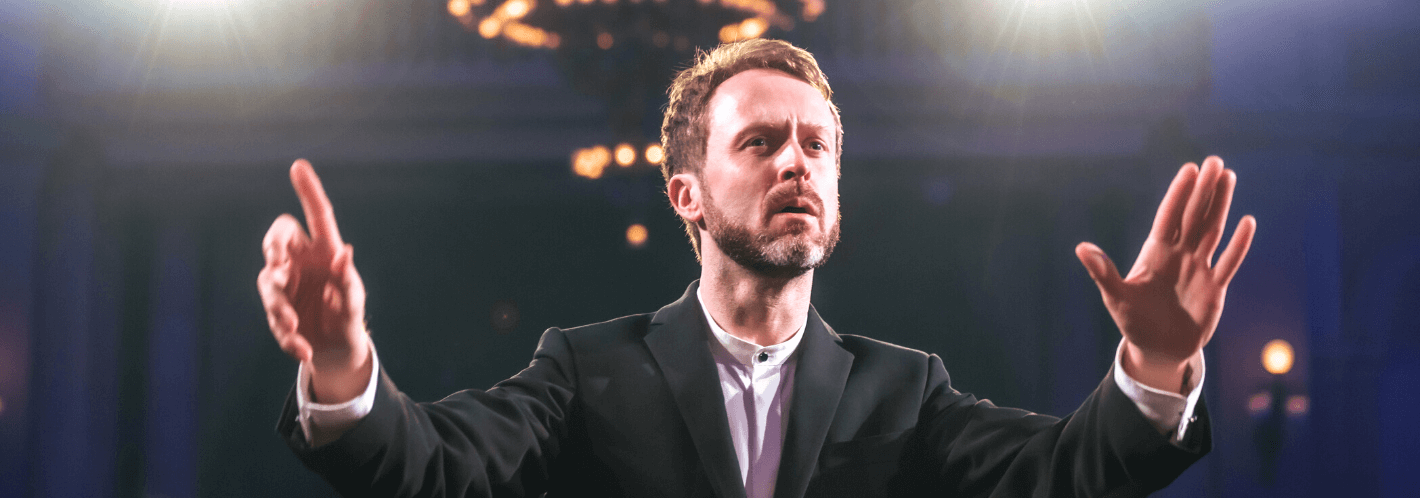
Lithuanian soprano Asmik Grigorian was born in Vilnius and studied at the Lithuanian Music and Theatre Academy. She was a founding member of Vilnius City Opera and has twice been awarded the Golden Stage Cross (the highest award for singers in Lithuania), in 2005 for her debut as Violetta and in 2010 for her performance as Mrs. Lovett Sweeney Todd. Asmik won the Young Female Singer prize at the International Opera Awards in 2016, followed by Female Singer of the Year in 2019. Asmik has made a name for herself on both the concert and operatic platforms since her international career began with a triumphant performance of Madama Butterfly at the Royal Swedish Opera, proving herself as a committed actress and soprano. She then went on to perform Fedora at the same house with established director Christof Loy, with whom she regularly collaborates, followed by Wozzeck at the Concertgebouw Amsterdam with Markus Stenz, which received glowing reviews. In 2017 she made her Salzburg Festival debut in Wozzeck directed by William Kentridge and conducted by Vladimir Jurowski. This was followed in 2018 by her critically acclaimed title role debut as Salome at the Salzburg Festival, in a new production by Romeo Castellucci under the baton of Franz Welser-Möst. Described as “a Salome to end all Salomes” (Financial Times), the role won her the 2019 Austrian Music Theater Award for Best Female Lead. The 2018/19 season saw Asmik’s triumphant house and role debut at Teatro alla Scala as Marietta in Korngold’s Die tote Stadt under Alan Gilbert in a production by Graham Vick, and her role debut as Iolanta at Oper Frankfurt. The 2019/20 season, although cut short, saw Asmik’s return to the role of Manon Lescaut at Oper Frankfurt and at the Bolshoi, and Chrysothemis Elektra at the Salzburg Festival in a production by Krzysztof Warlikowski under Franz Welser-Möst, and in concert performing Shostakovich 14 with the Orchestre de la Suisse Romande under Alexander Shelley, and Beethoven IX under Riccardo Muti at the Salzburg Festival. Asmik returned to the stage in the 2020/21 season as the title role in Christof Loy’s Rusalka at the Teatro Real Madrid under Ivor Bolton. She performed the title role in Madama Butterfly for her debut at the Wiener Staatsoper and made her concert debut at the Opéra de Paris. The summer festival season saw Asmik’s debut at Bayreuth as Senta in Dmitri Tcherniakov’s new production of Die Fliegende Hollander and a return to Salzburg for Elektra, highlighting the special relationship she shares with the festival. An exciting 2021/22 season begins with Asmik’s highly anticipated debut at the Royal Opera House Covent Garden in a new production of Jenufa by Claus Guth. Asmik returns to the Wiener Staatsoper for two productions; as Elisabetta in Don Carlo under Franz Welser-Möst; and as the title role in Manon Lescaut in a Robert Carsen production under Nicola Luisotti. Asmik will then return to La Scala for Queen of Spades under Valery Gergiev, and make her debuts at the Deutsche Staatsoper in Jenufa in a production by Damiano Michieletto, and Festspielhaus Baden-Baden in Queen of Spades under Kirill Petrenko. Asmik works with many of the world's leading conductors including Valery Gergiev, Gianandrea Noseda, Vasily Petrenko, Franz Welser-Möst, Yves Abel, Vladimir Jurowski, Kirill Petrenko, Oksana Lyniv, Markus Stenz, Mikhail Tatarnikov, Alan Gilbert, and Michael Tilson-Thomas. Asmik frequently collaborates with top stage directors including Dmitri Tcherniakov, Romeo Castellucci, Damiano Michieletto, Robert Carsen, Claus Guth, Dalia Ibelhauptaitė, Christof Loy, Barrie Kosky, Alex Ollé, Peter Konwitschny, Robert Wilson, and Vasily Barkhatov to name a few. 2022 will see the release of Asmik’s debut album, a recording of Rachmaninov Songs with pianist Lukas Genusias for Alpha Classics. They will subsequently perform the programme in a series of recitals around Europe in the 2021/22 season, visiting La Scala Milano, Grand Théâtre de Genève, and the Laeiszhalle Hamburg among many others.

The Rudolfinum is one of the most important Neo-Renaissance edifices in the Czech Republic. In its conception as a multi-purpose cultural centre it was quite unique in Europe at the time of its construction. Based on a joint design by two outstanding Czech architects, Josef Zítek and Josef Schultz, a magnificent building was erected serving for concerts, as a gallery, and as a museum. The grand opening on 7 February 1885 was attended by Crown Prince Rudolph of Austria, in whose honour the structure was named. In 1896 the very first concert of the Czech Philharmonic Orchestra took place in the Rudolfinum's main concert hall, under the baton of the composer Antonín Dvořák whose name was later bestowed on the hall.
